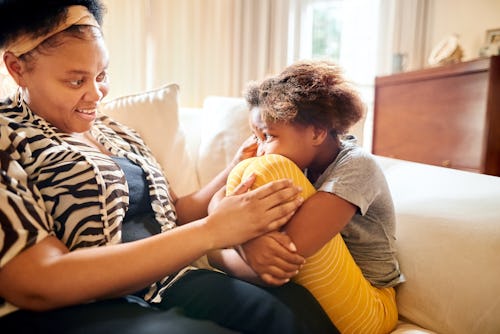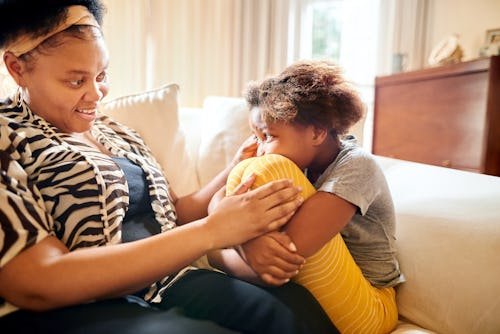
If using the public restroom with your kid always causes a full-blown meltdown — thanks, extra loud hand dryers and violently flushing toilets — then you’re probably familiar with overstimulation. That tearful, shut-down, get-me-out-of-here state can look a little different for every child, but regardless of how it presents, you should know what to do when your child is overstimulated.
The good news is that all kids can learn to cope, and there are ways to lessen the impact of overstimulation for neurodiverse kids who could benefit from a little extra support.
What does overstimulation look like in kids?
The TV is blaring, your kids are bickering, the dog is barking, and it’s so hot standing over the stove. You’re familiar with the anxious, about-to-blow feeling of overstimulation, but how can you tell when your child is feeling that way?
“Overstimulation happens when children are overwhelmed by more experiences, sensations, noise, and activity than they can cope with. Any child or teen, or adults for that matter, can become overwhelmed by circumstances,” says Dr. Dan Marullo, a pediatric psychologist at Children’s of Alabama.
Overstimulation can look like agitation, irritability, crying, whining, or clingy behavior, Marullo says. Your child may also withdraw from the situation, like leaving a party to go sit by themselves for a while. “Some children may physically reduce stimulation by putting their hands over their ears or retreating under a blanket or hoodie,” Marullo says. You can also think of overstimulation behaviors like you would anxiety ones: they tend to resemble fight, flight, or freeze reactions.
“Fight behaviors can include crying, screaming and yelling, and physical agitation,” says Dr. Stephanie Vetere Sims, M.D., child and adult psychiatrist at Baptist Health/Wolfson Children’s Behavioral Health. “Flight behaviors may look like frantic attempts to get away from the situation. Freezing will look like your child is shutting down, so it could include closing their eyes, being unable to speak, dropping to the ground, or covering their ears.”
What to do when your child is overstimulated
The biggest hack to avoiding overstimulation is learning what triggers your kid, be it loud noises, crowds, or being too hot or cold. Once you know what’s causing their feelings, you’ll be able to set parameters around those activities and start helping them deal in the midst of overstimulation.
- Talk to your child before going into a situation you think might be overstimulating. “Encourage your child to let you know if they are starting to feel overstimulated,” sayas Vetere Sims. “You can choose a word that makes sense to your child, like upset, stressed, overwhelmed, or uncomfortable. Let your child know that it’s OK to ask for a break and have a plan for what that break might look like.”
- Place reasonable limits on activities that are sending your kid over the edge. “For example, children who are playing a game and become frustrated would benefit from a break. The child may not want to, but it’s up to parents to recognize their child’s behavior and set limits,” says Marullo. Maybe your child likes playing with friends, but birthday parties always end in a breakdown. Who’s to say you can’t leave right after the cake is cut? It might be a fight at first, but after a few times doing it, your child will probably realize it’s the best way to have fun and feel sane when they’re done.
- Seize the opportunity to teach coping skills to manage stress and discomfort. This could look like stepping outside of a busy gathering for a breather together, or emphasizing that it’s OK to head home if they’ve had enough fun. “Experience as well as brain growth and maturation all affect the ability of a child to manage overstimulation,” Marullo says. “Early experience and learning how to manage frustration are critical skills and will help a child as they grow and mature.”
- Ask your child what helps them calm down before they need it. This is a conversation to have at a “neutral time,” not mid-overstimulated meltdown, Vetere Sims says. “Do they like quiet music? Hugs or cuddles? Movement? A comfort item such as a stuffed animal? Noise-canceling headphones? If you know in advance about ways to help your child calm down, you can start using those strategies as soon as you see signs of overstimulation.”
- Provide support to help your kid deal with overstimulating environments. “For children with special needs, like autism spectrum disorder, parents can take steps to mitigate the effects of the environment based upon their child’s particular needs,” Marullo says. “For example, provide noise-canceling headphones for children with noise sensitivities. Take the child to the store or restaurant during off hours to reduce crowds. Certainly, teaching and providing therapies to help a child learn coping skills if they have special needs is always important.”
Are some children more likely to become overstimulated than others?
Most definitely, Marullo confirms. Age is a major factor; younger kids are more likely to be overwhelmed by their surroundings simply because, well, they’re new here. They haven’t yet had time to be exposed to all the things. As they grow from childhood through adolescence, kids’ brains develop the ability to manage their emotions and behaviors more effectively, too.
“Children with psychological disorders such as ADHD, neurodevelopmental disorders like autism spectrum disorder or language disorders, sensory issues, intellectual disabilities, depression, or anxiety may be at higher risk, though they too can learn to cope and manage with assistance from their caregivers and professionals,” Marullo says.
But really, any child can get overstimulated, he notes. A bad night of sleep coupled with being hungry and having a big project due at school can be enough to do it. Though it can be difficult to deal with in the moment, helping your child learn to cope with overstimulation is one more way you can prepare them to deal with distress over anything in life. It’s a lifelong skill that you’ll both be glad you gave them.
Disclaimer: This story has not been edited by us and is published as shown on Scary Mommy.


Leave a Reply